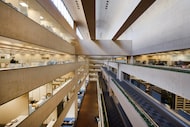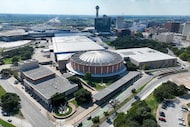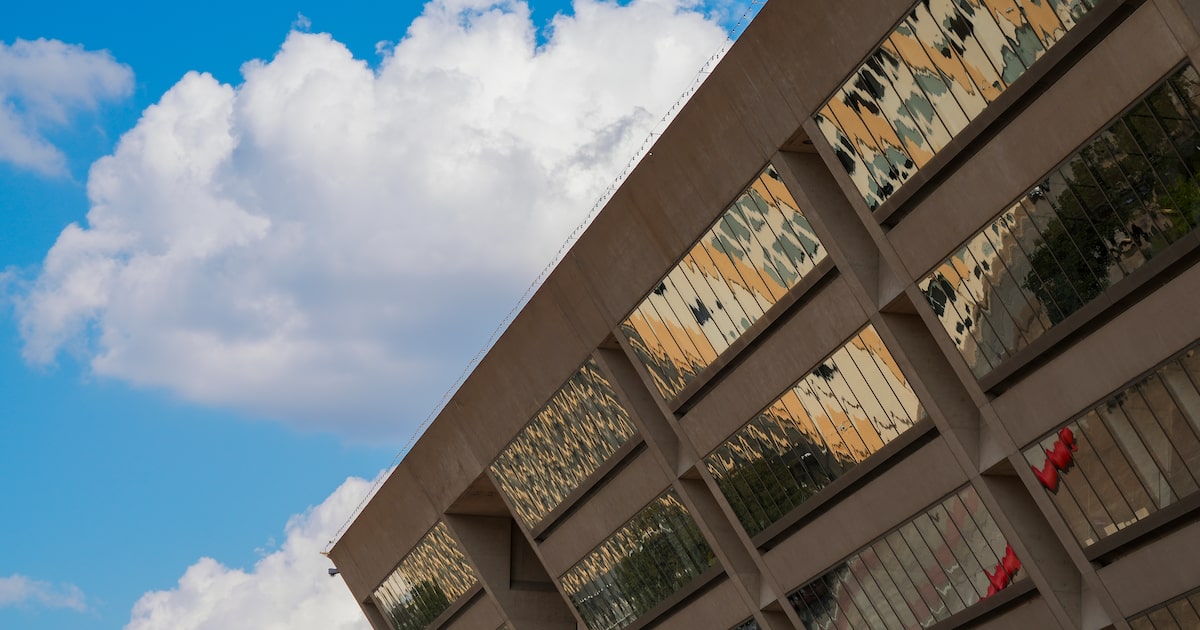A chorus of residents filled the community room Monday night with a clear and consistent plea to those deciding the future of City Hall: slow down, get the facts and don’t erase Dallas’ memory.
At a public meeting organized by council members Paul Ridley and Cara Mendelsohn, residents expressed growing frustration with what they described as a rushed, opaque process surrounding the potential relocation of Dallas City Hall.
Related

“This is moving really, really, really fast,” Mendelsohn said.
Breaking News
Ridley said the city still lacks a full structural analysis of the building, which opened in 1978 and was designed by the renowned architect I. M. Pei. This is a key factor, he said, before any discussion of alternatives can take place.
The conversation follows city staff’s estimate that maintaining City Hall over the next decade could cost more than $500 million, sparking debate over whether to repair or replace the 47-year-old structure.
But for most of those who spoke Monday night, the issue went far beyond concrete or costs. No one spoke in favor of tearing down the building.
“This isn’t about numbers,” said Anthony Rash, a design professional and District 1 resident. “It’s about memory. When we demolish buildings, we don’t just lose brick and mortar — we sever our connection to collective memory. Deferred maintenance is not a failure of the building; it’s a failure of stewardship.”
Several speakers drew parallels between City Hall and other Dallas landmarks that narrowly escaped demolition, such as the Texas Theatre and the Forest Theater.
“We can reuse and preserve,” Rash said. “Our history isn’t a burden, it’s an asset.”
‘Something’s wrong with these numbers’
Others questioned the credibility of the financial estimates presented to the Finance Committee.
Jesus Peña, an Oak Cliff resident and real estate agent, described the $25 million to $142 million repair range for the underground garage as “a variance that makes no sense.”
“In real estate, you don’t move forward on a deal without concrete facts,” Peña said. “A $120 million spread is insane. This would be a no-deal in any normal transaction.”
Discussions of City Hall repairs have been on the back burner for years. Water leaks, damages to the foundation, structural issues in the parking garage, and outdated electrical and heating, ventilation, and air conditioning systems, are among the list of issues plaguing the building. But the true cost of repairs will not be known until a full inspection of the building occurs in 2026.
Concerns over trust surfaced repeatedly. Several speakers, including Norman Alston, a preservation architect, questioned how repair estimates could rise from $68 million in 2016 to $345 million today.
“That kind of increase reflects a catastrophic event — which didn’t happen,” Alston said. “Something’s wrong with these numbers.”
Jim Anderson, another resident, said the prospect of losing City Hall to redevelopment “feels like we’re working against ourselves,” questioning whether deferred maintenance had been allowed to justify such a move.
Anderson mentioned that City Hall was more than just a government building; he said the place serves as a spot for protests and marches, where people come together.
Former council members and preservationists echoed that frustration, warning that Dallas has a long history of erasing civic landmarks in the name of progress, from Little Mexico to historic schools and churches.
Another speaker, Raven Leday, described her childhood visits to City Hall and the memories she created.
“It’s where I learned what this city was. How do you know where you’re going if you don’t know where you came from?”
Symbolic meaning
While these discussions are underway, there are also questions about whether the land on which the building sits is suitable for a new Dallas Mavericks sports arena. City officials have expressed their desire to keep the basketball team downtown. A revamped Kay Bailey Hutchison Convention Center is expected to anchor massive redevelopment in the area abutting Interstate 30.
Downtown resident Samuel Mortimer joked that he was there to advocate for tearing down City Hall. After a silence, he said, “Just kidding, we lost our damn minds?”
“If the seat of government is sold for an arena or a casino, that will be the most shameful thing this city has ever done,” said Mortimer.
Related

For many, the symbolic meaning of City Hall outweighed even the financial debate.
“When I walk out and see that building, I feel proud,” said longtime resident Jerry Green. “It’s our civic home. Developers are salivating over the land, but you can’t replace this.”
Others pointed to environmental and cultural consequences. Melissa Kingston called demolition a “violation of the city’s Climate Action Plan,” warning of the massive carbon footprint tied to tearing down the poured-concrete structure.
Resident Kelly Mitchell gave away blue pins and gold stickers that read, “Save Dallas City Hall.”
During the meeting, several residents pointed out that other cities have modernized their civic buildings without abandoning them. Boston, they noted, is renovating its own brutalist City Hall, completed in 1968, with phased repairs, improved public spaces and sustainability upgrades.
“Boston didn’t walk away from its City Hall,” Alyx Scott said. “They invested in it. Dallas should be doing the same, not clearing ground for someone else’s arena.”

